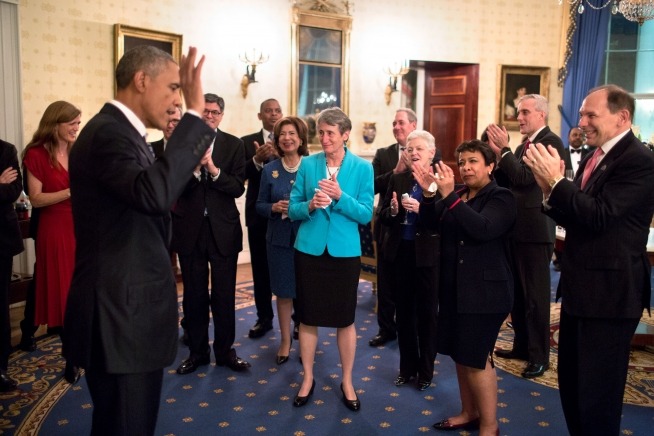photo: whitehouse.gov
They say the president gave his seventh State of the Union address last Tuesday, but personally, I count eight. On February 24, 2009, Barack Obama’s 35th full day in office, he delivered a speech to a joint session of Congress to explain how America had gotten into its economic mess and how his just-passed $787 billion stimulus bill would help get it out. He spoke about foreign policy, too: about his plans to wrench America’s orientation toward the rest of the world away from the snarling martial barks of the Bush years, rebuild alliances, reestablish diplomacy as a first resort, and use “all elements of our national power”—for, he concluded, “living our values doesn’t make us weaker, it makes us safer and it makes us stronger.” It started Obama’s first term off with a wave of nearly universal approval—even among Republicans.
I’ve always seen that speech as a key to understanding a certain sort of road not taken by this administration. It’s one that could have led Obama to considerably more success than he has enjoyed, and perhaps even fulfilled expectations that his would be a “transformational” and not a “transactional” presidency—a failure Obama himself seemed to acknowledge by explicitly, almost apologetically, comparing himself unfavorably to Abraham Lincoln and Franklin D. Roosevelt. I agree with him. It’s not that he has not scored important, even historic successes as president: the Affordable Care Act, the Iranian nuclear deal. But a president is transformational when he meets head on, and transcends, the preeminent historical crisis of his times—the incapacity of the weak American state to deal with a Depression in Roosevelt’s case, the sectional crisis over slavery in Abraham Lincoln’s. Add Ronald Reagan, who Obama once cited as another model of a transformational president, whose accomplishment was turning “liberalism” into a dirty word. Obama’s historical task was to do the same for conservatism. It hasn’t happened; conservatism has instead thrived. That was not foreordained.
Remember the Republican response that evening in 2009? It featured Bobby Jindal’s infamous schoolboy singsong flaying of the new law as a sinkhole of waste—140 million “for something called volcano monitoring!” (A month afterward, a volcano sent up a 60,000-foot cloud of ash over parts of Alaska, including Sarah Palin’s hometown of Wasilla.) The pundits, even Republican ones, declared it the end of an era. As David Brooks put it on CNN:
“To come up at this moment in history with a stale, government-is-the-problem, we can’t trust the federal government—it’s just a disaster for the Republican Party.…in a moment when only the federal government is big enough to actually do stuff—to just ignore all that, and just say ‘government is a problem, corruption, earmarks, wasteful spending,’ it’s just a form of nihilism. It’s just not where the country is. It’s not where the future of the country is.”
The American people agreed. Obama’s full-throated defense of the role of government in stabilizing the U.S. economy, and the world, got a 92 percent overall approval rating.
What a historic opportunity!
In the previous six years following the Republican takeover of the Senate, America had embarked upon an almost unprecedented experiment: effective conservative control of all three branches of government. The result, of course, was smoking ruins. Out of those political ashes Obama’s commanding electoral victory arose.
The strategic situation was propitious, too. By the time Obama gave that speech, senior GOP members of Congress had already met with conservative movement leaders and Republican strategists and agreed to ignore the electoral mandate and commit the party to a course of absolute obstruction, the better to turn Obama into a one-term president.
The Obama White House either never learned about this or didn’t care. With aching sincerity, the president kept extending his hand in bipartisan fellowship, only to have an anvil dropped on it. The parable of Lucy and the football became our modern-day version of the myth of Sisyphus.
At any number of moments he could have staged what Bill Clinton called a “Gary Cooper moment.” The next time they proffered extremism in the face of his invitation to compromise, Obama could do what Clinton did when congressional Republicans offered Medicare cuts as their budget “compromise” in 1995. Clinton told Rep. Dick Armey, as Paul Begala recalled, “If you want somebody to sign this budget you’re going to have to put another president behind that desk, because I will never do it.” Armey responded by shutting down the government. Clinton made that his appeal to the public. He said, effectively, I set the table for a moderate middle course. I did so patiently and evenhandedly. The Republicans responded by flipping over the table. See how childish they are?
Obama has always refused that Gary Cooper role. Not his style: there is no blue America, there is no red America. Consider his reaction to the Tea Party victories of 2010. After that election, political scientists crunched all kinds of numbers to figure out what happened. Here are the only numbers that mattered, I think: (1) by a two-to-one margin, voters surveyed on election day believed that under Obama their taxes had gone up; but (2) in actual fact the taxes of 95 percent had gone down. Given all the right-wingers who won congressional seats crying TEA—“Taxed Enough Already”—it was the perfect opportunity to call out Republican successes, not as a mandate, but a Big Lie.
He could have done what Ronald Reagan did following his own “shellacking” in 1982: offer a full-throated pledge to stay the course. Instead, in his press conference the next day, Obama practically waved the white flag of surrender. He said the vote “confirmed what I’ve heard from folks all across America”—that his presidency was on the wrong track. He was “eager to sit down with members of both parties and figure out how we can move forward together,” because “no person, no party, has a monopoly on wisdom.” He took “direct responsibility for the fact that we have not made as much progress as we need to make.” So it was time to find “common ground.”
He took a Republican lie and chiseled it for all time into the tablets of history.
Why did this keep happening? In 2012 Ryan Lizza of The New Yorker got hold of a series of memos that revealed a White House defined by reactive lurches—a White House, I wrote back then, that “let themselves be guided by clichés made up by Republicans and parroted by pundits.” Rooted, always, in the confidence that he could find reasonable negotiating partners in the Republican leadership, who could discipline their caucuses into going along with reasonable deals.
But a more historically astute and strategically clear-eyed White House would have known this was fantasy. James Fallows explained the nature of compromise with a Congress controlled by the opposition. Fallows, who had worked as a speechwriter and adviser for Jimmy Carter, cited a memo that a Harvard-trained lawyer who had clerked for Supreme Court Justice Oliver Wendell Holmes wrote to Harry Truman after the 1946 elections. Republicans had taken control of both Houses of Congress seven months after Truman had succeeded FDR, and James Rowe Jr. warned the President that cooperation with Congress “is a one way street.”
What Obama should understand was what Rowe explained to Truman, Fallows wrote:
“[W]hen an opposing party holds Congress, it will always view weakening the president as its paramount goal.… Its leaders will define ‘compromise’ as the president’s accepting all of their demands and abandoning his own.”
In stuttering steps, Obama seemed to begin to learn the lesson. In The New Republic Noam Scheiber wrote of a moment in 2011 when, after pursuing “painstaking negotiations with Republicans over a series of dead-end deficit deals, even as the economy teetered on the edge of a second recession,” after two and a half years of “hatching proposals with an eye toward winning over the opposition,” the president told aides to put together a second stimulus package instead, imploring them not to “self-edit” their proposals. He took $450 million of spending to the electorate. His poll numbers went steadily up for all the next year. He won reelection.
Then he forgot the lesson.
In 2012 with utter stalemate in budget negotiations—and a looming “fiscal cliff”—Obama offered a deal including massive budget cuts across the government. He assumed the Republicans would never allow it to happen because it included defense cuts. The Republicans called his bluff.
Obama has always had defenders who insisted that moves like these somehow were those of a genius whose brilliance would be revealed in the fullness of time: “eleventh dimensional chess,” as some mocked the relentless apologia of people like Andrew Sullivan, who shortly before the fiscal-cliff standoff described a wizardly Obama playing a “show-don’t-tell, long-game form of domestic politics,” where “what matters to him is what he can get done, not what he can immediately take credit for.”
Really?
In this particular showdown, Republicans called the bluff and let the sequester go into effect, with terrible cuts to necessary social programs—and they’re still in effect. It also ended up making 85 percent of the Bush tax cuts permanent, and effectively took further tax increases—on anyone—off the table for future negotiations. They won the radical budget they wanted all along, and worse. Grover Norquist, for one, declared victory: “Sequester is the big win. It defines the decade.”
That was late in 2013. What has happened since? He finally does seem to get it. Which brings us to last Tuesday’s speech. I loved it. I loved how he finally said the Republicans were practitioners of the Big Lie. On terrorism and ISIS: “Over-the-top claims that this is World War III just play into their hands…. That’s not leadership; that’s a recipe for quagmire, spilling American blood and treasure that ultimately weakens us. It’s the lesson of Vietnam, of Iraq—and we should have learned it by now.” And tragically, even saying so obvious a truth that ISIS does “not threaten our national existence” is a bold thing to do. On Vox.com, Max Fisher noted the “hear-a-pin-drop reaction from members of Congress” after Obama ill-advisedly waited for applause: “on the main stage of American politics, acknowledging this well-known fact is considered not just impolitic but practically unspeakable.”
And yet Barack Obama spoke it, devil take the hindmost.
On the economy, he began with “a basic fact,” as far from the currently fashionable Republican apocalyptism as it could be: “the United States of America, right now, has the strongest, most durable economy in the world. . . . Anyone claiming that America’s economy is in decline is peddling fiction.” He continued with a compassionate observation that the economy all the same is still producing pain for ordinary Americans, which is radical in its way: a rising tide does not lift all boats.
Was that Barack Obama (or Elizabeth Warren?) defending the role government should play in “making sure the system’s not rigged in favor of the wealthiest and biggest corporations?”
He continued, it is true, with a feint toward one of the most irritating clichés of the Democratic establishment. As one of Lyndon Johnson’s aides said of his boss back in the 1960s, Democrats love to claim that education “would cure everything from chilblains to ingrown toenails”—even fight wage stagnation and inequality, which it in fact cannot do. Corporate Democrats say it can—and, relatedly, blame the problem on “technological change”—because it lets them dodge the hard work of educating the public about power relations and contradictions within the capitalist economy. But the fact is that this part went by in a flash; that education is an important thing for a president to talk up because, hell, education is a good in itself; and—well, Rome wasn’t built in a day, and mumbling briefly that “real opportunity requires every American to get the education and training they need to land a good-paying job” turned out to be mere throat-clearing for some marvelous plain speaking: “Of course a great education isn’t all we need in this new economy. We also need benefits and protections that provide a basic measure of security.” (His best laugh line: “After all, it’s not much of a stretch to say that some of the only people in America who are going to work the same job, in the same place, with a health and retirement package, for 30 years, are sitting in this chamber.”)
That “Social Security and Medicare are more important than ever; we shouldn’t weaken them, we should strengthen them.” That “for Americans short of retirement, basic benefits should be just as mobile as everything else is today. That’s what the Affordable Care Act is all about.” That “there should be a system of wage insurance.”
(Screw you, “gig economy.”)
And was it Barack Obama (or Elizabeth Warren?) defending the role government should play in “making sure the system’s not rigged in favor of the wealthiest and biggest corporations?” And observing that “after years of record corporate profits, working families won’t get more opportunities or bigger paychecks by letting big banks or big oil or hedge funds make their own rules at the expense of everyone else; or by allowing attacks on collective bargaining to go unanswered.”
Gone, it would seem, is the day when Obama went on “The View” and responded to a question about JPMorgan Chase losing $2 billion in ill-advised trades: “JPMorgan is one of the best-managed banks there is. Jamie Dimon, the head of it, is one of the smartest bankers we’ve got.” Now, he ventriloquizes the devastating conclusion to the movie The Big Short: “Food stamp recipients didn’t cause the financial crisis; recklessness on Wall Street did. Immigrants aren’t the reason wages haven’t gone up enough; those decisions are made in the boardrooms that too often put quarterly earnings over long-term returns. It’s sure not the average family watching tonight that avoids paying taxes through offshore accounts.”
He sketched a picture of America under conservative rule as a barren hellscape: “Those with money and power will gain greater control over the decisions that could send a young soldier to war, or allow another economic disaster, or roll back the equal rights and voting rights that generations of Americans have fought, even died, to secure.” He added: “As frustration grows, there will be voices urging us to fall back into tribes, to scapegoat fellow citizens who don’t look like us, or pray like us, or vote like we do, or share the same background. We can’t afford to go down that path. It won’t deliver the economy we want, or the security we want, but most of all, it contradicts everything that makes us the envy of the world.”
He said the kind of thing you hear at left-wing meetings, but I never expected to hear it from him: “The United States of America is the most powerful nation on Earth. Period. It’s not even close. We spend more on our military than the next eight nations combined.”
And then there was that luminescent, humiliating jape: “Sixty years ago, when the Russians beat us into space, we didn’t deny Sputnik was up there. We didn’t argue about the science.” Now, with climate change, Republicans do deny and argue about the science because of “entrenched interests who want to protect the status quo.”
He got the lesson. He finally has. Ten months ago, his retiring senior adviser for strategy and communications Daniel Pfeiffer admitted as much. “We don’t have the ability to communicate with them—we can’t even break into the tight communication circles to convince them that climate change is real.” So, Obama changed. Used to be, “Whenever we contemplate[d] bold progressive action, whether that’s the president’s endorsement of marriage equality, or coming out strong on power-plant rules to reduce current pollution, on immigration, on net neutrality, you get a lot of hemming and hawing in advance about what this is going to mean: Is this going to alienate people? Is this going to hurt the president’s approval ratings? What will this mean in red states?” Now, they just do it. “There’s never been a time when we’ve taken progressive action and regretted it.”
The president concluded the economic section with a marvelous lesson in one of the most poorly acknowledged major shifts of post-World War II history: the transformation of corporate governance from a model balancing the interests of owners, communities, workers and consumers, to one in which only “shareholder value” matters. “This year,” he promised, “I plan to lift up the many businesses who’ve figured out that doing right by their workers ends up being good for their shareholders, their customers, and their communities, so that we can spread those practices across America.”
That would be big. I can’t wait to see what he comes up with. And if he’d had the vision to try it seven years ago, maybe it would have even been transformational.







I caught bits of the speech. Honestly, I stopped paying much attention to Obama years ago, for reasons that this article elaborates quite well. The bits I caught were pleasing, but the only response I could muster was, “Why are saying this now?”
Sanity is breaking out in our relations with Iran. A war even more (much more!) disastrous than our Iraq war crime seems much less likely than it did not so many years ago. For this Obama deserves credit.
Otherwise his term has been nothing but disappointing. Once he appointed wheezers like Biden and Clinton and Geithner, anybody who was paying attention knew that “Hope & Change” really meant more neoliberalism and some nibbling-round-the-edges “reform”. At least, that’s how I saw it, and I expected to be underwhelmed before I voted for him. Even so, I was astonished at how casually and stupidly he threw away once-in-a-generation opportunities — in his first hundred days!
I **still** don’t know how to make sense of Obama’s idiotic fetish for “bipartisanship”. Republicans never ever made it a secret that they intended to oppose everything he did from the beginning. Any dimly sentient creature who’s observed the Republican Party as it is now knows that “good government” is a punchline for Republicans, a thing they scorn. It’s ridiculous to imagine that Obama believes that compromise and clean living will always win out in the end — we’re talking about a guy who chums around with **Rahm Emmanuel**!!
One explanation is that he’s not that clever, despite all the gas about Obama the “constitutional scholar”. It’s more charitable than the other one, which is that he relied on Republicans to push him in the rightward direction that he really always sympathized with from the start.
Soon Obama will be making speeches to tycoons for six-figure fees. I expect he’s beginning to arrange the schedule now. He’ll leave behind no coalition worthy of the name, a more powerful oligarchy, and an executive branch even more secretive, more able to stumble into foolish wars than Bush’s. But he can cluck about all that disapprovingly at Davos, I suppose.
That’s exactly right. I would think a constitutional scholar would be able to recognize that torture and an utter usurpation of democratic rigjhts (the TPP) are, well, nconstitutional.
OBAMA’S LEGACY:
“Yes we can”
became
WE COULD OF, WE WOULD OF, WE SHOULD OF
B U T WE DIDN’T !!!!
Obama could still be transformational if he would lead a cause for a new Constitutional Convention.
That bit about being the most powerful nation, no question, period, ’cause of all that gargantuan military spending, whcih you seem to endorse, aren’t you mistaking violence and force for power?
You’re comparing what he could honestly get done in the 2010s,with the internet existing more and more polarizingly, and cable news offering mostly opinion, to what scrutinized Reagan and Clinton..network news and noncompetitive brand new cable news.
Not another public figure I know of could have gotten more done with more opposition in this climate. And another won’t for a decade. I’m good.
Part of me agrees and thinks that he would have changed the nation AND been more popular if he had concluded after the election that the R’s were led by a bunch of sick old men terrified of the extremists who populate their primaries and that the only way to govern was to take his Congressional majorities and enact a new deal for the 21st century. But then I look at the minuscule margins by which the stimulus and ACA passed and I’m faced with the fact that more progressive legislation likely would have died in Congress, leaving us with no loaf instead of half a loaf. Really hard to re-run history and see how a campaign for single-payer insurance, say, would have played out, for example, and even with some serious push, a carbon tax couldn’t get through Congress in 2010. And for all the political acumen of Clinton, he never won as a high a percentage of the popular vote as Obama did in 2012, let alone 2008. I suppose you could argue that a more progressive agenda might have brought people out to vote in 2010 (both the 2010 and 2014 Congressional elections were determined entirely by the very low turnouts generally and by young folks, minorities, and liberals in particular), and that would have made a difference, but midterm turnout in recent decades has been driven by fear and anger, not gratitude for accomplishment. And I don’t think anybody, on the left or right, anticipated how deep the racial antagonism to him would run AFTER the election, or that it would strengthen over time as R leaders and Fox stoked it. Last but not least, the New Deal looks really radical in retrospect, but FDR usually (with some key exceptions) chose moderate rather than radical reforms (that’s why our social insurance is paid for by a payroll tax, which about the worst way to fund it)–but those reforms set precedents that later were expanded and systematized, making them transformative. The ACA, for example, is going to look very transformative in 20 years, for example, by which time I’m betting all the states will have accepted the Medicaid expansion and a public option will have been added.
Does Mr. Perlstein seem to thing that Obama was some sort of Democrat or political leader to begin with. The narrative fits the actions much better if one simply starts with Obama is an empty suit careerist who became the Golden Boy for a corrupt neo-liberal political machine. Don’t look at what he hasn’t done as President, look at who made him a Senator and how well he has served their interests. And no, I never voted for him, I am from Chicago and I saw him do nothing all the way to the top. People voted for this guy based on the color of his skin and not the content of his character, and have spent eight years wondering why Obama doesn’t match the fantasy they applied to him.
“People voted for this guy based on the color of his skin and not the content of his character, and have spent eight years wondering why Obama doesn’t match the fantasy they applied to him.”
Well, he makes nice speeches. More than once I’ve seen believing Dems forget this week’s Republican-lite Obama sell-out, because they’re dazzled with last night’s pretty speech. It’s depressing to see, especially when you see it over and over.
Also, Obama’s rise is just a symptom of the profound lack of talent in American politics, and particularly in the Democratic Party. (I don’t like calling what Republicans have “talent”, but they have organized pretty well, and they can show astonishing single-minded discipline.) True, American politicians have always been mostly hacks and glad-handers (more than 95% of them, anyway). But even by that yardstick the Dems look impoverished. I have great hopes for Sanders (and he’s only a kind of pro forma Dem), but he’s well into his 70’s. Absent him, **Clinton** is the best the Dems can offer?!?!